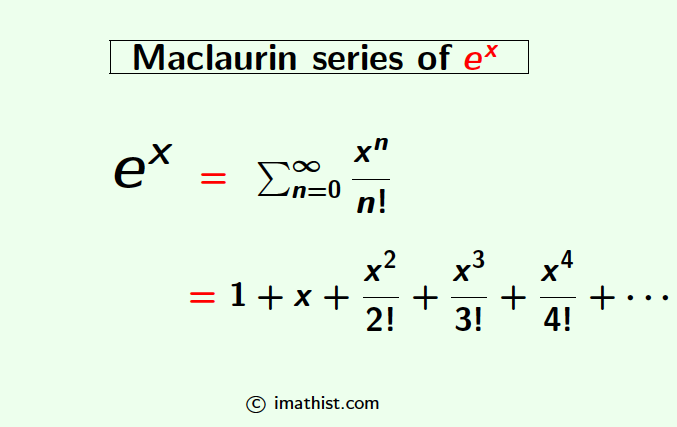The Maclaurin series expansion of ex or the Taylor series expansion of ex at x=0 is given by the following summation:
ex = $\sum_{n=0}^\infty \dfrac{x^n}{n!}$
= $1+x+\dfrac{x^2}{2!}+\dfrac{x^3}{3!}+\dfrac{x^4}{4!}+\cdots$.
In this post, we will learn how to find the series expansion of ex.

Taylor Series Expansion of ex at x=0
The Maclaurin series expansion of a function f(x), that is, the Taylor series of f(x) at x=0 is given as follows:
$f(x)=\sum_{n=0}^\infty \dfrac{f^{(n)}(0)}{n!} x^n$ …(∗)
where f(n) denotes the n-th derivative of f(x). The 0-th derivative of f(x) is equal to f(0).
Put f(x)=ex.
As the derivative of ex is ex itself, we have:
f(0) = e0 = 1.
f$’$(x) = ex ⇒ f$’$(0) = e0 = 1
f$^{”}$(x) = ex ⇒ f$^{”}$(0) = e0 = 1
f(3)(x) = ex ⇒ f(3)(0) = e0 = 1
f(4)(x) = ex ⇒ f(4)(0) = e0 = 1
ans so on.
Substituting the above values in (∗) , the Maclaurin series expansion for f(x)=ex is equal to
$f(x)=f(0)+xf'(0)+\dfrac{x^2}{2!}f^{”}(0)$ $+\dfrac{x^3}{3!}f^{(3)}(0)$ $+\dfrac{x^4}{4!}f^{(4)}(0)+\cdots$
⇒ $e^x$ $=1+x+\dfrac{x^2}{2!}+\dfrac{x^3}{3!}+\dfrac{x^4}{4!}+\cdots$.
In sigma notation, the Maclaurin series expansion of ex will be equal to
ex = $\sum_{n=0}^\infty \dfrac{x^n}{n!}$.
Note that the above series for ex converges for all real values. So the radius of converges of ex series expansion is the interval (-∞, ∞).
Also Read:
Maclaurin series expansion of sinx
Maclaurin series expansion of cosx
FAQs
Q1: What is the Taylor series expansion of e^x at x=0?
Answer: The Taylor series expansion of ex at x=0 is equal to 1+x+x2/2! + x3/3! +x4/4!+ …
Q2: What is the Maclaurin series expansion of e^x?
Answer: The Maclaurin series expansion of ex is equal to 1+x+x2/2! + x3/3! +x4/4!+ …